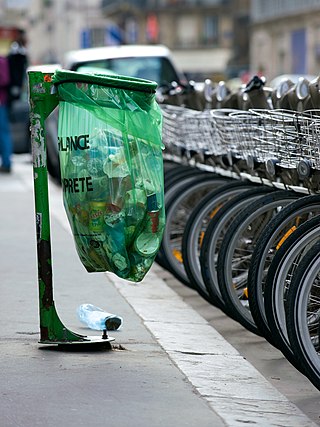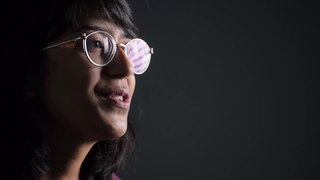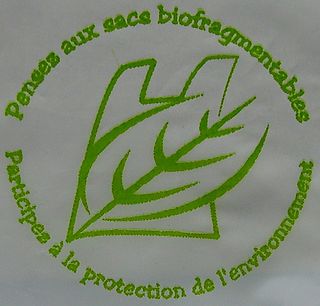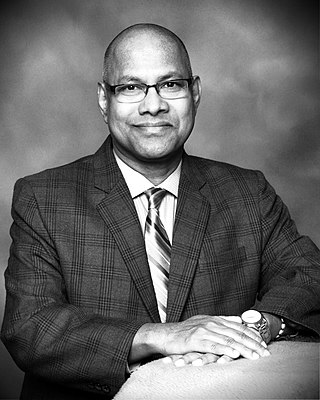Related Research Articles

Biodegradation is the breakdown of organic matter by microorganisms, such as bacteria and fungi. It is generally assumed to be a natural process, which differentiates it from composting. Composting is a human-driven process in which biodegradation occurs under a specific set of circumstances.

Cotton swabs or cotton buds are wads of cotton wrapped around a short rod made of wood, rolled paper, or plastic. They are most commonly used for ear cleaning, although this is not recommended by physicians. Other uses for cotton swabs include first aid, cosmetics application, cleaning, infant care and crafts. Some countries have banned the plastic-stemmed versions in favor of biodegradable alternatives over concerns about marine pollution.

Plastic shopping bags, carrier bags, or plastic grocery bags are a type of plastic bag used as shopping bags and made from various kinds of plastic. In use by consumers worldwide since the 1960s, these bags are sometimes called single-use bags, referring to carrying items from a store to a home. However, it is rare for bags to be worn out after single use and in the past some retailers incentivised customers to reuse 'single use' bags by offering loyalty points to those doing so. Even after they are no longer used for shopping reuse for storage or trash is common, and modern plastic shopping bags are increasingly recyclable or compostable. In recent decades, numerous countries have introduced legislation restricting the sale of plastic bags, in a bid to reduce littering and plastic pollution.

A plastic bag, poly bag, or pouch is a type of container made of thin, flexible, plastic film, nonwoven fabric, or plastic textile. Plastic bags are used for containing and transporting goods such as foods, produce, powders, ice, magazines, chemicals, and waste. It is a common form of packaging.

Polyhydroxyalkanoates or PHAs are polyesters produced in nature by numerous microorganisms, including through bacterial fermentation of sugars or lipids. When produced by bacteria they serve as both a source of energy and as a carbon store. More than 150 different monomers can be combined within this family to give materials with extremely different properties. These plastics are biodegradable and are used in the production of bioplastics.
Bioplastics are plastic materials produced from renewable biomass sources, such as vegetable fats and oils, corn starch, straw, woodchips, sawdust, recycled food waste, etc. Some bioplastics are obtained by processing directly from natural biopolymers including polysaccharides and proteins, while others are chemically synthesised from sugar derivatives and lipids from either plants or animals, or biologically generated by fermentation of sugars or lipids. In contrast, common plastics, such as fossil-fuel plastics are derived from petroleum or natural gas.
Polyethylene or polythene film biodegrades naturally, albeit over a long period of time. Methods are available to make it more degradable under certain conditions of sunlight, moisture, oxygen, and composting and enhancement of biodegradation by reducing the hydrophobic polymer and increasing hydrophilic properties.

Biodegradable plastics are plastics that can be decomposed by the action of living organisms, usually microbes, into water, carbon dioxide, and biomass. Biodegradable plastics are commonly produced with renewable raw materials, micro-organisms, petrochemicals, or combinations of all three.

Biobased economy, bioeconomy or biotechonomy is economic activity involving the use of biotechnology and biomass in the production of goods, services, or energy. The terms are widely used by regional development agencies, national and international organizations, and biotechnology companies. They are closely linked to the evolution of the biotechnology industry and the capacity to study, understand, and manipulate genetic material that has been possible due to scientific research and technological development. This includes the application of scientific and technological developments to agriculture, health, chemical, and energy industries.

A plastic bottle is a bottle constructed from high-density or low density plastic. Plastic bottles are typically used to store liquids such as water, soft drinks, motor oil, cooking oil, medicine, shampoo, milk, and ink. The size ranges from very small bottles to large carboys. Consumer blow molded containers often have integral handles or are shaped to facilitate grasping.
Tillman Gerngross is an Austro-American scientist.

Biodegradable bags are bags that are capable of being decomposed by bacteria or other living organisms.

Plastics are a wide range of synthetic or semi-synthetic materials that use polymers as a main ingredient. Their plasticity makes it possible for plastics to be moulded, extruded or pressed into solid objects of various shapes. This adaptability, plus a wide range of other properties, such as being lightweight, durable, flexible, and inexpensive to produce, has led to its widespread use. Plastics typically are made through human industrial systems. Most modern plastics are derived from fossil fuel-based chemicals like natural gas or petroleum; however, recent industrial methods use variants made from renewable materials, such as corn or cotton derivatives.
Yield10 Bioscience is a company developing new technologies to achieve improvements in crop yield to enhance global food security.

Danimer Scientific, formerly known as Meredian Holdings Group Inc. and MHG, is a biopolymer manufacturer headquartered in Bainbridge, Georgia.
Eugene S. Stevens is a Professor of Physical Chemistry at Binghamton University. He is best known for his research in biodegradable plastics. He has been a quoted expert in articles published in the New York Times, Bloomberg Businessweek, and the International Herald Tribune.

Synthetic microbial consortia are multi-population systems that can contain a diverse range of microbial species, and are adjustable to serve a variety of industrial, ecological, and tautological interests. For synthetic biology, consortia take the ability to engineer novel cell behaviors to a population level.

Polymateria Ltd is a British technology company developing biodegradable plastic alternatives. In 2020, the privately owned company was the first to achieve certified biodegradation of the most commonly-littered forms of plastic packaging in real-world conditions, in less than a year without creating microplastics.
Olagoke Olabisi is an author, editor, educator, mentor, inventor, and entrepreneur. A Nigerian–American chemical engineer, Olagoke is the Chief Consultant and CEO of Infra-Tech consulting LLC, an energy consulting company focused on corrosion and materials engineering. He has 9 patents and a total of 97 publications including Fugacity and Vapor Pressure of Non-Polar Liquids at Low Temperatures, Thermoplastics Beyond the Year 2000: A Paradigm, and Handbook of Thermoplastics, 2nd Edition. He has been involved in academia and industry in the United States, Nigeria, Saudi Arabia, and Kuwait. He is a mentor to students and young professionals.

Amar K. Mohanty is a material scientist and biobased material engineer, academic and author. He is a Professor and Distinguished Research Chair in Sustainable Biomaterials at the Ontario Agriculture College and is the Director of the Bioproducts Discovery and Development Centre at the University of Guelph.
References
- 1 2 "Scheer, Frederic". Scheer, Frederic. Retrieved 2023-02-14.
- 1 2 3 4 L6NRG. "Welcome to L6NRG, an Oil & Gas Exploration Company". L6NRG. Retrieved 2023-02-14.
- 1 2 "Frederic Scheer Inventions, Patents and Patent Applications - Justia Patents Search". patents.justia.com. Retrieved 2023-02-14.
- 1 2 3 "Hong Yuan Holding Group (HGYN): The president & CEO, Frederic Scheer, an..." InvestorsHub. Retrieved 2023-02-14.
- ↑ "BPI - Certified Compostable". BPIWorld. Retrieved 2023-02-14.
- ↑ "Owler - Cereplast".
- ↑ PrintMag (2011-02-23). "Make Your Mark, Save the World, and Win $25,000". PRINT Magazine. Retrieved 2023-02-14.
- ↑ "With bioplastics, Cereplast aims to make consumer products sustainable". ZDNET. Retrieved 2023-02-14.
- ↑ Montet, Virginie. "Potatoes, algae replace oil in US company's plastics". phys.org. Retrieved 2023-02-14.
- ↑ "Cutting fossil fuel use with bioplastics part 1".
- ↑ Previously, Tiffany Hsu Tiffany Hsu is a former staff writer for the Los Angeles Times; economy, she wrote about the California; Food, Fast; restaurants; retail; native, alternative energy for the Business section A. Bay Area; graduate, UC Berkeley; fan, eternal Nor-Cal; Times-Dispatch, she once worked for the San Francisco Bay Guardian She also did a stint at the Richmond (2011-04-22). "Biodegradable plastics: Plant symbol chosen as icon". Los Angeles Times. Retrieved 2023-02-14.
{{cite web}}:|first6=has generic name (help) - ↑ LandGate. "LandGate.com - Data Intelligence & Marketplace for Land Resources". LandGate.com. Retrieved 2023-02-14.
- ↑ "L6NRG Announces the Launch of L6NRG MONTANA I, L.P." PRWeb. Retrieved 2023-02-14.
- ↑ Alercell. "Alercell". Alercell. Retrieved 2023-02-14.
- ↑ "Alercell to Attend the November Interactive Moneyshow Virtual Expo". markets.businessinsider.com. Retrieved 2023-02-14.
- ↑ Foundation, Scheer. "Scheer Foundation". Scheer Foundation. Retrieved 2023-02-14.
- ↑ AP, SHENZHEN HMEDIUM INFORMATION TECHNOLOGY CO ,LTD-Private w/ (2020-07-26). "Scheer Foundation Expand Operations to Uganda". ACCESSWIRE News Room. Retrieved 2023-02-14.
This article has not been added to any content categories . Please help out by adding categories to it so that it can be listed with similar articles. (July 2023) |